Editor’s Note: This is the second chapter of Alfred the Great, by Jacob Abbot (published 1872)
II. The Anglo-Saxons
Anyone who will look around upon the families of his acquaintance will observe that family characteristics and resemblances prevail not only in respect to stature, form, expression of countenance, and other outward and bodily tokens, but also in regard to the constitutional temperaments and capacities of the soul. Sometimes we find a group in which high intellectual powers and great energy of action prevail for many successive generations, and in all the branches into which the original stock divides; in other cases, the hereditary tendency is to gentleness and harmlessness of character, with a full development of all the feelings and sensibilities of the soul. Others, again, exhibit congenital tendencies to great physical strength and hardihood, and to powers of muscular exertion and endurance. These differences, notwithstanding all the exceptions and irregularities connected with them, are obviously, where they exist, deeply seated and permanent. They depend very slightly upon any mere external causes. They have, on the contrary, their foundation in some hidden principles connected with the origin of life, and with the mode of its transmission from parent to offspring, which the researches of philosophers have never yet been able to explore.
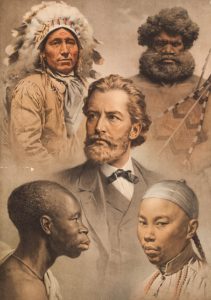
These same constitutional and congenital peculiarities which we see developing themselves all around us in families, mark, on a greater scale, the characteristics of the different nations of the earth, and in a degree much higher still, the several great and distinct races into which the whole human family seems to be divided. Physiologists consider that there are five of these great races, whose characteristics, mental as well as bodily, are distinctly, strongly, and permanently marked. These characteristics descend by hereditary succession from father to son, and though education and outward influences may modify them, they can not essentially change them. Compare, for example, the Indian and the African races, each of which has occupied for a thousand years a continent of its own, where they have been exposed to the same variety of climates, and as far as possible to the same general outward influences. How entirely diverse from each other they are, not only in form, color, and other physical marks, but in all the tendencies and characteristics of the soul! One can no more be changed into the other, than a wolf, by being tamed and domesticated, can be made a dog, or a dog, by being driven into the forests, be transformed into a tiger. The difference is still greater between either of these races and the Caucasian race. This race might probably be called the European race, were it not that some Asiatic and some African nations have sprung from it, as the Persians, the Phœnicians, the Egyptians, the Carthaginians, and, in modern times, the Turks. All the nations of this race, whether European or African, have been distinguished by the same physical marks in the conformation of the head and the color of the skin, and still more by those traits of character—the intellect, the energy, the spirit of determination and pride—which, far from owing their existence to outward circumstances, have always, in all ages, made all outward circumstances bend to them. That there have been some great and noble specimens of humanity among the African race, for example, no one can deny; but that there is a marked, and fixed, and permanent constitutional difference between them and the Caucasian race seems evident from this fact, that for two thousand years each has held its own continent, undisturbed, in a great degree, by the rest of mankind; and while, during all this time, no nation of the one race has risen, so far as is known, above the very lowest stage of civilization, there have been more than fifty entirely distinct and independent civilizations originated and fully developed in the other. For three thousand years the Caucasian race have continued under all circumstances, and in every variety of situation, to exhibit the same traits and the same indomitable prowess. No calamities, however great—no desolating wars, no destructive pestilence, no wasting famine, no nigh of darkness, however universal, and gloomy, has ever been able to keep them long in degradation or barbarism. There is not now a barbarous people to be found in the whole race, and there has not been one for a thousand years.
Nearly all the great exploits, and achievements too, which have signalized the history of the world, have been performed by this branch of the human family. They have given celebrity to every age in which they have lived, and to every country that they have ever possessed, by some great deed, or discovery, or achievement, which their intellectual energies have accomplished. As Egyptians, they built the Pyramids, and reared enormous monoliths, which remain as perfect now as they were when first completed, thirty centuries ago. As Phœnicians, they constructed ships, perfected navigation, and explored, without compass or chart, every known sea. As Greeks, they modeled architectural embellishments, and cut sculptures in marble, and wrote poems and history, which have been ever since the admiration of the world. As Romans, they carried a complete and perfect military organization over fifty nations and a hundred millions of people, with one supreme mistress over all, the ruins of whose splendid palaces and monuments have not yet passed away. Thus has this race gone on, always distinguishing itself, by energy, activity, and intellectual power, wherever it has dwelt, whatever language it has spoken, and in whatever period of the world it has lived. It has invented printing, and filled every country that it occupies with permanent records of the past, accessible to all. It has explored the heavens, and reduced to precise and exact calculations all the complicated motions there. It has ransacked the earth, systematized, arranged, and classified the vast melange of plants, and animals, and mineral products to be found upon its surface. It makes steam and falling water do more than half the work necessary for feeding and clothing the human race; and the howling winds of the ocean, the very emblems of resistless destruction and terror, it steadily employs in interchanging the products of the world, and bearing the means of comfort and plenty to every clime.
The Caucasian race has thus, in all ages, and in all the varieties of condition in which the different branches of it have been placed, evinced the same great characteristics, marking the existence of some innate and constant constitutional superiority; and yet, in the different branches, subordinate differences appear, which are to be accounted for, perhaps, partly by difference of circumstances, and partly, perhaps, by similar constitutional diversities—diversities by which one branch is distinguished from other branches, as the whole race is from the other races with which we have compared them. Among these branches, we, Anglo-Saxons ourselves, claim for the Anglo-Saxons the superiority over all the others.
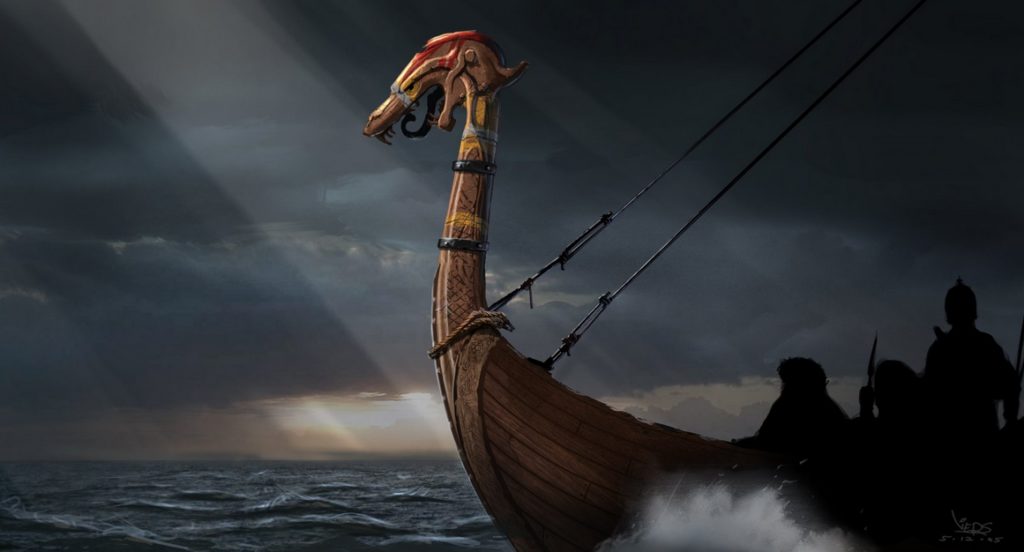
The Anglo-Saxons commenced their career as pirates and robbers, and as pirates and robbers of the most desperate and dangerous description. In fact, the character which the Anglo-Saxons have obtained in modern times for energy and enterprise, and for desperate daring in their conflicts with foes, is no recent fame. The progenitors of the present race were celebrated every where, and every where feared and dreaded, not only in the days of Alfred, but several centuries before. All the historians of those days that speak of them at all, describe them as universally distinguished above their neighbors for their energy; and vehemence of character, their mental and physical superiority, and for the wild and daring expeditions to which their spirit of enterprise and activity were continually impelling them. They built vessels, in which they boldly put forth on the waters of the German Ocean or of the Baltic Sea on excursions for conquest or plunder. Like their present posterity on the British isles and on the shores of the Atlantic, they cared not, in these voyages, whether it was summer or winter, calm or storm. In fact, they sailed often in tempests and storms by choice, so as to come upon their enemies the more unexpectedly.
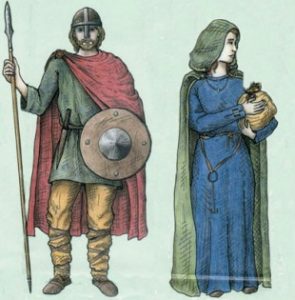
They would build small vessels, or rather boats, of osiers, covering them with skins, and in fleets of these frail floats they would sally forth among the howling winds and foaming surges of the German Ocean. On these expeditions, they all embarked as in a common cause, and felt a common interest. The leaders shared in all the toils and exposures of the men, and the men took part in the counsels and plans of the leaders. Their intelligence and activity, and their resistless courage and ardor, combined with their cool and calculating sagacity, made them successful in every attempt. If they fought, they conquered; if they pursued their enemies, they were sure to overtake them; if they retreated, they were sure to make their escape. They were clothed in a loose and flowing dress, and wore their hair long and hanging about their shoulders; and they had the art, as their descendants have now, of contriving and fabricating arms of such superior construction and workmanship, as to give them, on this account alone, a great advantage over all contemporary nations. There were two other points in which there was a remarkable similarity between this parent stock in its rude, early form, and the extended social progeny which represents it at the present day. One was the extreme strictness of their ideas of conjugal fidelity, and the stern and rigid severity with which all violations of female virtue were judged. The woman who violated her marriage vows was compelled to hang herself. Her body was then burned in public, and the accomplice of her crime was executed over the ashes. The other point of resemblance between the ancient Anglo-Saxons and their modern descendants was their indomitable pride. They could never endure any thing like submission. Though sometimes overpowered, they were never conquered. Though taken prisoners and carried captive, the indomitable spirit which animated them could never be really subdued. The Romans used sometimes to compel their prisoners to fight as gladiators, to make spectacles for the amusement of the people of the city. On one occasion, thirty Anglo-Saxons, who had been taken captive and were reserved for this fate, strangled themselves rather than submit to this indignity. The whole nation manifested on all occasions a very unbending and unsubmissive will, encountering every possible danger and braving every conceivable ill rather than succumb or submit to any power except such as they had themselves created for and their own ends; and their descendants, whether in England or America, evince much the same spirit still.
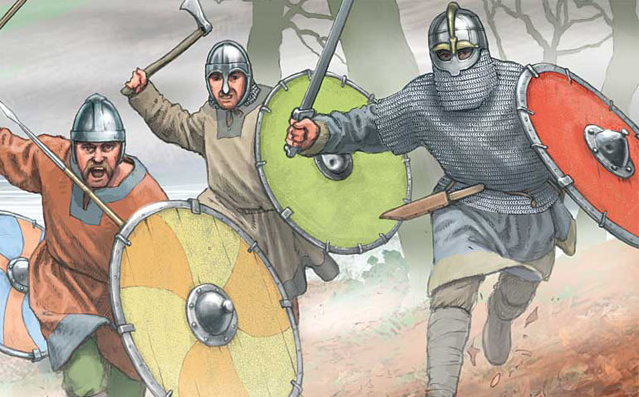
It was the landing of a few boat-loads of these determined and ferocious barbarians on a small island near the mouth of the Thames, which constitutes the great event of the arrival of the Anglo-Saxons in England, which is so celebrated in English history as the epoch which marks the real and true beginning of British greatness and power. It, is true that the history of England goes back beyond this period to narrate, as we have done, the events connected with the contests of the Romans and the aboriginal Britons, and the incursions and maraudings of the Picts and Scots; but all these aborigines passed gradually—after the arrival of the Anglo-Saxons—off the stage. The old stock was wholly displaced. The present monarchy has sprung entirely from its Anglo-Saxon original; so that all which precedes the arrival of this new race is introductory and preliminary, like the history, in this country, of the native American tribes before the coming of the English Pilgrims. As, therefore, the landing of the Pilgrims on the Plymouth Rock marks the true commencement of the history of the American Republic, so that of the Anglo-Saxon adventurers on the island of Thanet represents and marks the origin of the British monarchy. The event, therefore, stands as a great and conspicuous landmark, though now dim and distant in the remote antiquity in which it occurred.
And yet the event, though so wide-reaching and grand in its bearings and relations, and in the vast consequences which have flowed and which still continue to flow from it, was apparently a minute and unimportant circumstance at the time when it occurred. There were only three vessels at the first arrival. Of their size and character the accounts vary. Some of these accounts say they contained three hundred men; others seem to state that the number which arrived at the first landing was three thousand. This, however, would seem impossible, as no three vessels built in those days could convey so large a number. We must suppose, therefore, that that number is meant to include those who came at several of the earlier expeditions, and which were grouped by the historian together, or else that several other vessels or transports accompanied the three, which history has specially commemorated as the first arriving.
In fact, very little can now be known in respect to the form and capacity of the vessels in which these half-barbarous navigators roamed, in those days, over the British seas. Their name, indeed, has come down to us, and that is nearly all. They were called cyules; though the name is sometimes spelled, in the ancient chronicles, ceols, and in other ways. They were obviously vessels of considerable capacity, and were of such construction and such strength as to stand the roughest marine exposures. They were accustomed to brave fearlessly every commotion and to encounter every danger, raised either by winter tempests, or summer gales in the restless waters of the German Ocean.
The names of the commanders who headed the expedition which first landed have been preserved, and they have acquired, as might have been expected, a very wide celebrity. They were Hengist and Horsa. Hengist and Horsa were brothers.
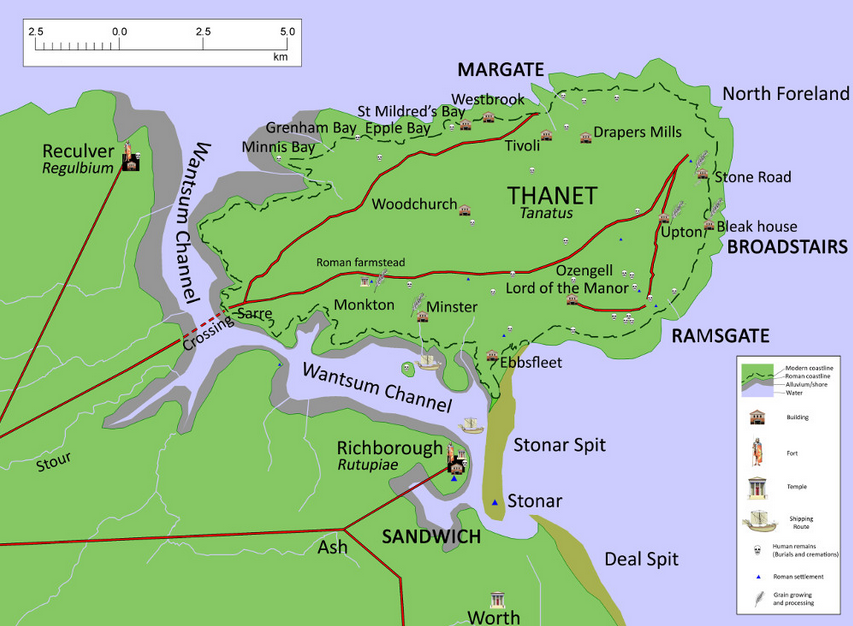
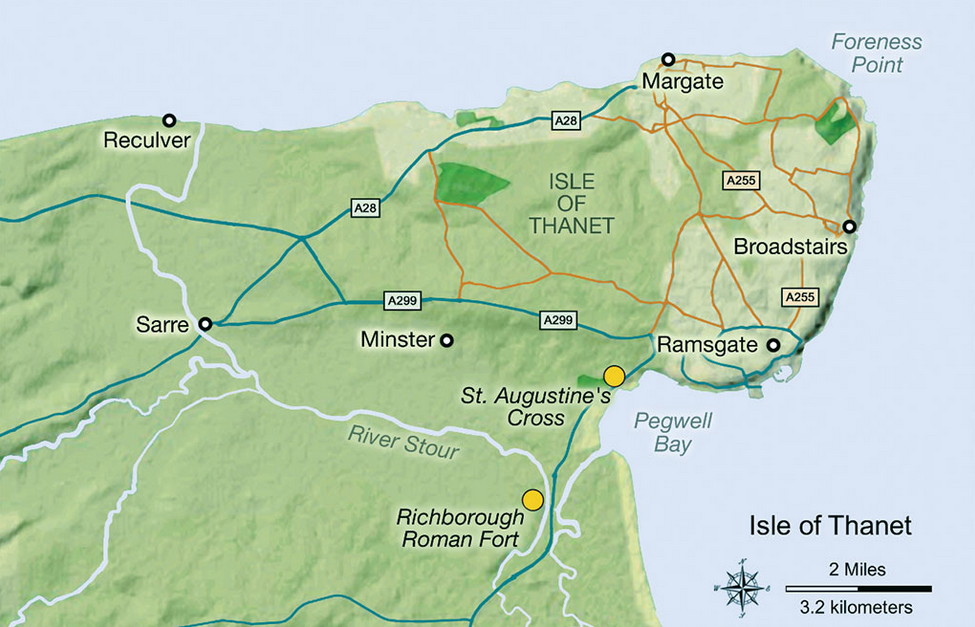
The place where they landed was the island of Thanet. Thanet is a tract of land at the mouth of the Thames, on the southern side; a sort of promontory extending into the sea, and forming the cape at the south side of the estuary made by the mouth of the river. The extreme point of land is called the North Foreland, which, as it is the point that thousands of vessels, coming out of the Thames, have to round in proceeding southward on voyages to France, to the Mediterranean, to the Indies, and to America, is very familiarly known to navigators throughout the world. The island of Thanet, of which this North Foreland is the extreme point, ought scarcely to be called an island, since it forms, in fact, a portion of the main land, being separated from it only by a narrow creek or stream, which in former ages, indeed, was wide and navigable, but is now nearly choked up and obliterated by the sands and the sediment, which, after being brought down by the Thames, are driven into the creek by the surges of the sea.
In the time of Hengist and Horsa the creek was so considerable that its mouth furnished a sufficient harbor for their vessels. They landed at a town called Ebbsfleet, which is now, however, at some distance inland.
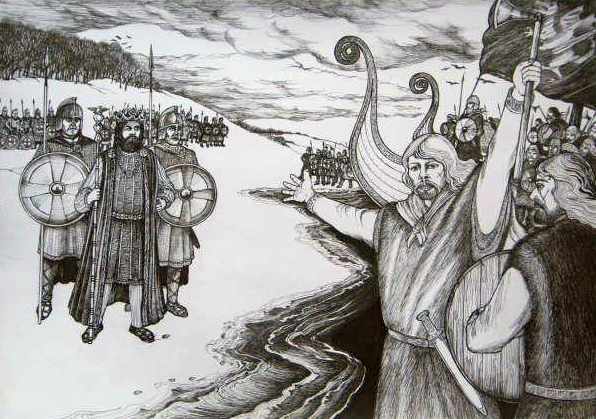 There is some uncertainty in respect to the motive which led Hengist and Horsa to make their first descent upon the English coast. Whether they came on one of their customary piratical expeditions, or were driven on the coast accidentally by stress of weather, or were invited to come by the British king, can not now be accurately ascertained. Such parties of Anglo-Saxons had undoubtedly often landed before under somewhat similar circumstances, and then, after brief incursions into the interior, had re-embarked on board their ships and sailed away. In this case, however, there was a certain peculiar and extraordinary state of things in the political condition of the country in which they had landed, which resulted in first protracting their stay, and finally in establishing them so fixedly and permanently in the land, that they and their followers and descendants soon became the entire masters of it, and have remained in possession to the present day. These circumstances were as follows:
There is some uncertainty in respect to the motive which led Hengist and Horsa to make their first descent upon the English coast. Whether they came on one of their customary piratical expeditions, or were driven on the coast accidentally by stress of weather, or were invited to come by the British king, can not now be accurately ascertained. Such parties of Anglo-Saxons had undoubtedly often landed before under somewhat similar circumstances, and then, after brief incursions into the interior, had re-embarked on board their ships and sailed away. In this case, however, there was a certain peculiar and extraordinary state of things in the political condition of the country in which they had landed, which resulted in first protracting their stay, and finally in establishing them so fixedly and permanently in the land, that they and their followers and descendants soon became the entire masters of it, and have remained in possession to the present day. These circumstances were as follows:
The name of the king of Britain at this period was Vortigern. At the time when the Anglo-Saxons arrived, he and his government were nearly overwhelmed with the pressure of difficulty and danger arising from the incursions of the Picts and Scots; and Vortigern, instead of being aroused to redoubled vigilance and energy by the imminence of the danger, as Alfred afterward was in similar circumstances, sank down, as weak minds always do, in despair, and gave himself up to dissipation and vice—endeavoring, like depraved seamen on a wreck, to drown his mental distress in animal sensations of pleasure. Such men are ready to seek relief or rescue from their danger from any quarter and at any price. Vortigern, instead of looking upon the Anglo-Saxon intruders as new enemies, conceived the idea of appealing to them for succor. He offered to convey to them, a large tract of territory in the part of the island where they had landed, on condition of their aiding him in his contests with his other foes.
Hengist and Horsa acceded to this proposal. They marched their followers into battle, and defeated Vortigern’s enemies. They sent across the sea to their native land, and invited new adventurers to join them. Vortigern was greatly pleased with the success of his expedient. The Picts and Scots were driven back to their fortresses in the remote mountains of the north, and the Britons once more possessed their land in peace, by means of the protection and the aid which their new confederates afforded them.
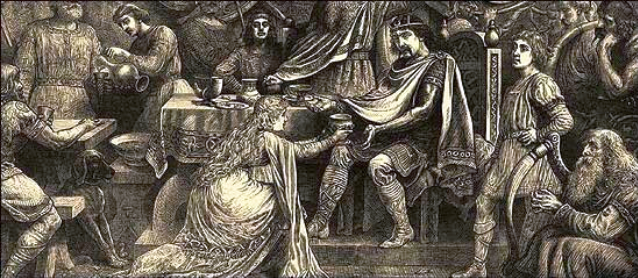
In the mean time the Anglo-Saxons were establishing and strengthening themselves very rapidly in the part of the island which Vortigern had assigned them—which was, as the reader will understand from what has already been said in respect to the place of their landing, the southeastern part—a region which now constitutes the county of Kent. In addition, too, to the natural increase of their power from the increase of their numbers and their military force, Hengist contrived, if the story is true, to swell his own personal influence by means of a matrimonial alliance which he had the adroitness to effect. He had a daughter named Rowena. She was very beautiful and accomplished. Hengist sent for her to come to England. When she had arrived he made a sumptuous entertainment for King Vortigern, inviting also to it, of course, many other distinguished guests. In the midst of the feast, when the king was in the state of high excitement produced on such temperaments by wine and convivial pleasure, Rowena came in to offer him more wine. Vortigern was powerfully struck, as Hengist had anticipated, with her grace and beauty. Learning that she was Hengist’s daughter, he demanded her hand. Hengist at first declined, but, after sufficiently stimulating the monarch’s eagerness by his pretended opposition, he yielded, and the king became the general’s son-in-law. This is the story which some of the old chroniclers tell. Modern historians are divided in respect to believing it. Some think it is fact, others fable.
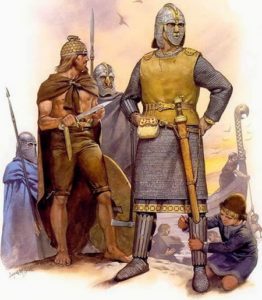
At all events, the power of Hengist and Horsa gradually increased, as years passed on, until the Britons began to be alarmed at their growing strength and multiplying numbers, and to fear lest these new friends should prove, in the end, more formidable than the terrible enemies whom they had come to expel. Contentions and then open quarrels began to occur, and at length both parties prepared for war. The contest which soon ensued was a terrible struggle, or rather series of struggles, which continued for two centuries, during which the Anglo-Saxons were continually gaining ground and the Britons losing; the mental and physical superiority of the Anglo-Saxon race giving turn, with very few exceptions, everywhere and always the victory.
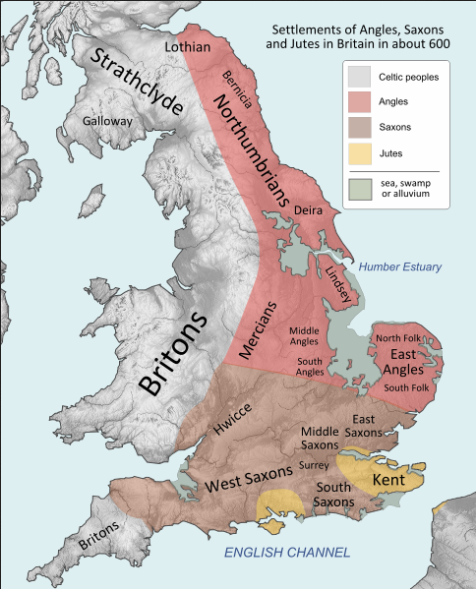
There were, occasionally, intervals of peace, and partial and temporary friendliness. They accuse Hengist of great treachery on one of these occasions: He invited his son-in-law, Vortigern, to a feast, with three hundred of his officers, and then fomenting a quarrel at the entertainment, the Britons were all killed in the affray by means of the superior Saxon force which had been provided for the emergency. Vortigern himself was taken prisoner, and held a captive until he ransomed himself by ceding three whole provinces to his captor. Hengist justified this demand by throwing the responsibility of the feud upon his guests; and it is not, in fact, at all improbable that they deserved their share of the condemnation.
The famous King Arthur, whose Knights of the Round Table have been so celebrated in ballads and tales, lived and flourished during these wars between the Saxons and the Britons. He was a king of the Britons, and performed wonderful exploits of strength and valor. He was of prodigious size and muscular power, and of undaunted bravery. He slew giants, destroyed the most ferocious wild beasts, gained very splendid victories in the battles that he fought, made long expeditions into foreign countries, having once gone on a pilgrimage to Jerusalem to obtain the Holy Cross. His wife was a beautiful lady, the daughter of a chieftain of Cornwall. Her name was Guenever. On his return from one of his distant expeditions, he found that his nephew, Medrawd, had won her affections while he was gone, and a combat ensued in consequence between him and Medrawd. The combat took place on the coast of Cornwall. Both parties fell. Arthur was mortally wounded. They took him from the field into a boat, and carried him along the coast till they came to a river. They ascended the river till they came to the town of Glastonbury. They committed the still breathing body to the care of faithful friends there; but the mortal blow had been given. The great hero died, and they buried his body in the Glastonbury church-yard, very deep beneath the surface of the ground, in order to place it as effectually as possible beyond the reach of Saxon rage and vengeance. Arthur had been a deadly and implacable foe to the Saxons. He had fought twelve great pitched battles with them, in every one of which he had gained the victory. In one of these battles he had slain, according to the traditional tale, four hundred and seventy men, in one day, with his own hand.
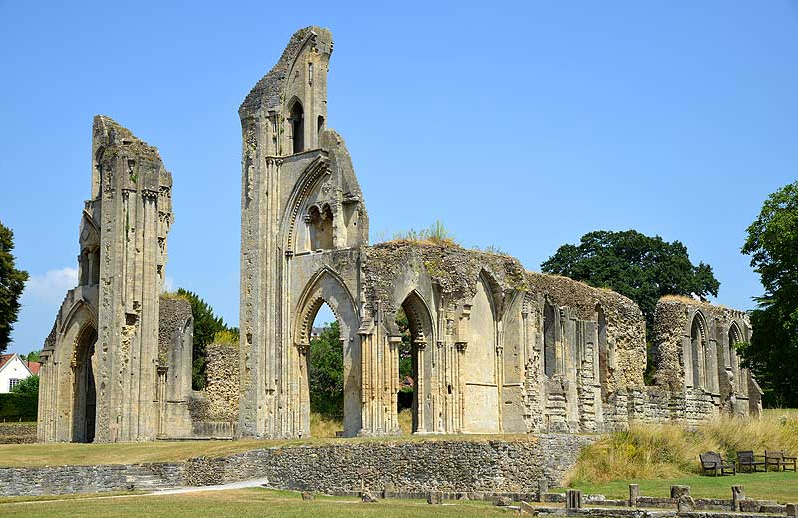
Five hundred years after his death, King Henry the Second, having heard from an ancient British bard that Arthur’s body lay interred in the Abbey of Glastonbury, and that the spot was marked by some small pyramids erected near it, and that the body would be found in a rude coffin made of a hollowed oak, ordered search to be made. The ballads and tales which had been then, for several centuries, circulating throughout England, narrating and praising King Arthur’s exploits, had given him so wide a fame, that great interest was felt in the recovery and the identification of his remains. The searchers found the pyramids in the cemetery of the abbey. They dug between them, and came at length to a stone. Beneath this stone was a leaden cross, with the inscription in Latin, “HERE LIES BURIED THE BODY OF GREAT KING ARTHUR.” Going down still below this, they came at length, at the depth of sixteen feet from the surface, to a great coffin, made of the trunk of an oak tree, and within it was a human skeleton of unusual size. The skull was very large, and showed marks of ten wounds. Nine of them were closed by concretions of the bone, indicating that the wounds by which those contusions or fractures had been made had been made had been healed while life continued. The tenth fracture remained in a condition which showed that that had been the mortal wound.
The bones of Arthur’s wife were found near those of her husband. The hair was apparently perfect when found, having all the freshness and beauty of life; but a monk of the abbey, who was present at the disinterment, touched it and it crumbled to dust.
Such are the tales which the old chronicles tell of the good King Arthur, the last and greatest representative of the power of the ancient British aborigines. It is a curious illustration of the uncertainty which attends all the early records of national history, that, notwithstanding all the above particularity respecting the life and death of Arthur, it is a serious matter of dispute among the learned in modern times whether any such person ever lived.
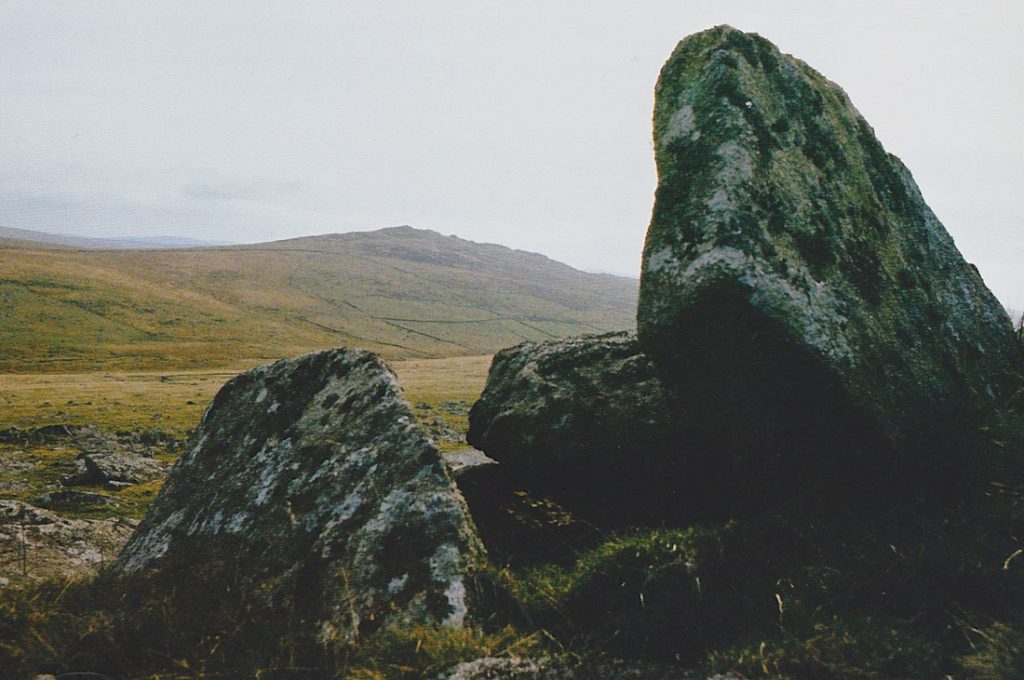
(Continue to Part 3)

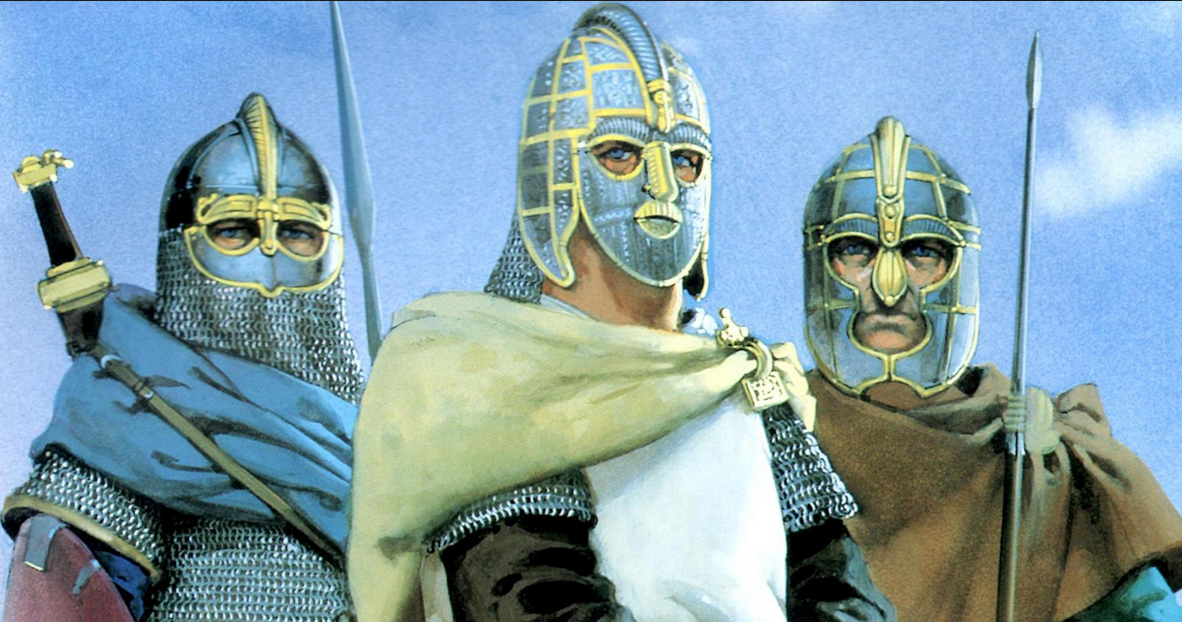


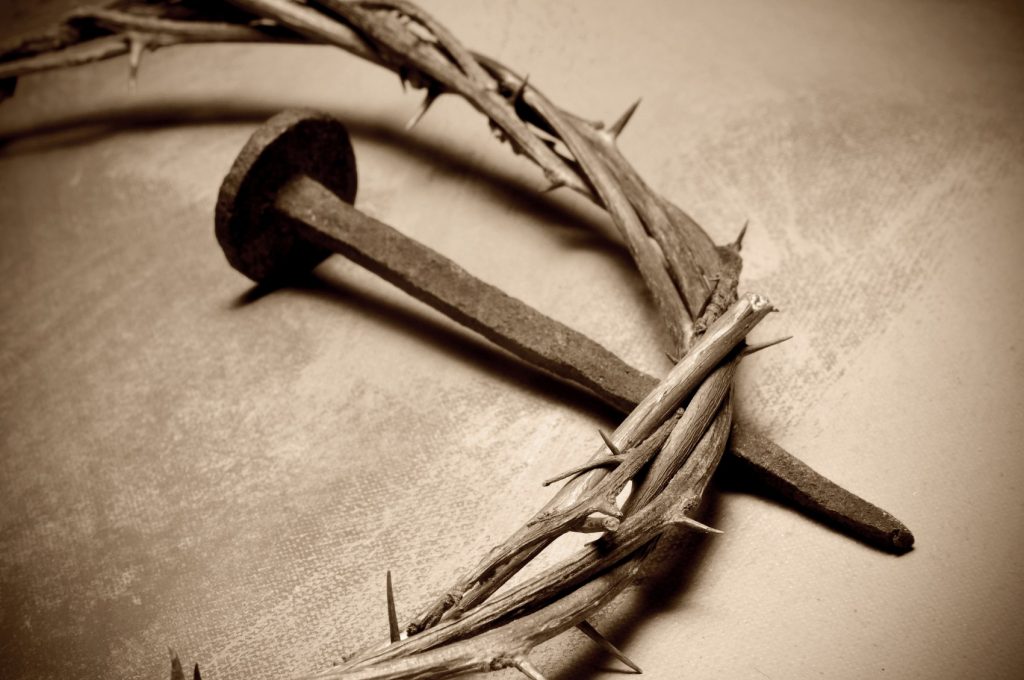





[…] Read Part 2 here […]
[…] Read Part 2 here […]
[…] Read Part 2 here […]
5
4.5